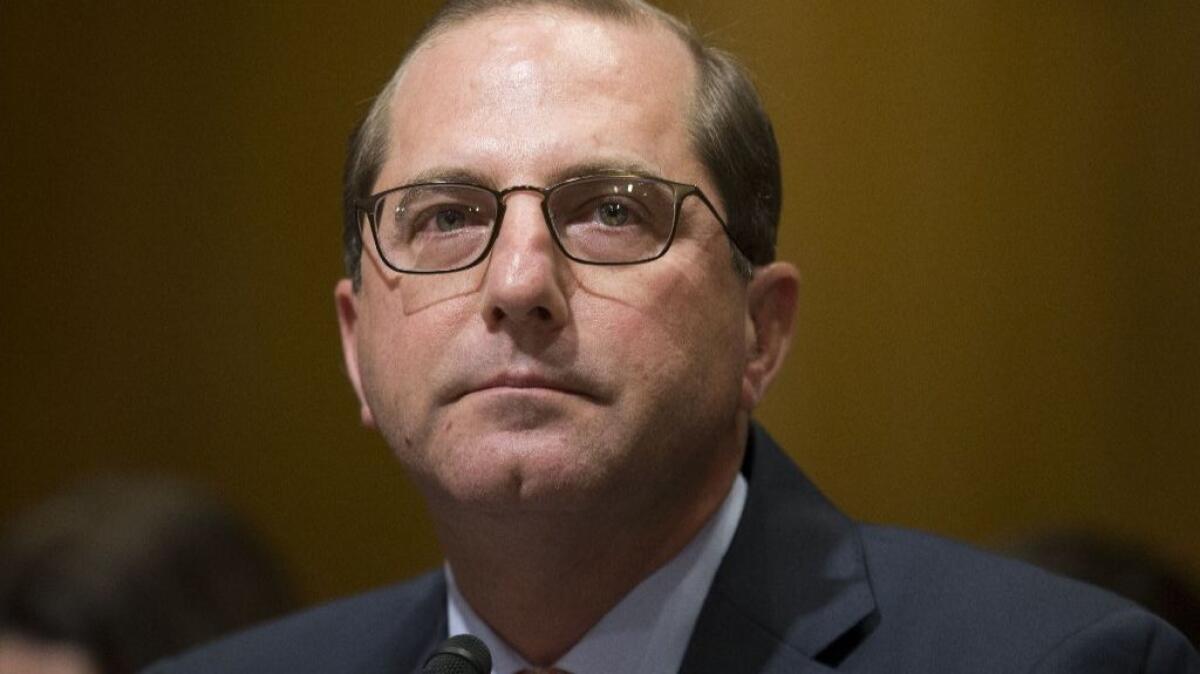Column: Trump’s pick for health secretary makes clear he’s totally the wrong guy for the job

Watching Alex Azar, President Trump’s nominee for health secretary, testify before the Senate Finance Committee this week, I realized he’s more impressive than I’d previously thought.
Unlike Energy Secretary Rick Perry, Azar isn’t alarmingly ignorant about the department he’d run. Unlike Scott Pruitt, head of the U.S. Environmental Protection Agency, he’s apparently not determined to tear down the very things he’s supposed to safeguard.
But Azar is still the wrong guy for the job.
This week’s hearing, one of a series of Azar’s encounters with senators on his road to leadership of the Department of Health and Human Services, began with the committee’s Republican chairman, Orrin Hatch, making clear that conservatives liked what they saw.
“If confirmed, Mr. Azar’s work will impact the lives of every single American. Now that’s a big job,” Hatch declared. “It requires knowledge, experience and most important strong leadership. Fortunately, our nominee brings all of this to the table.”
Well, OK then.
I’ll acknowledge that Azar came off in his more than two hours of testimony as bright, articulate and well-versed in the arcana of healthcare — a refreshing change from Education Secretary Betsy DeVos’ lack of awareness about public education, which didn’t deter GOP senators from putting her in charge.
The problem with Azar isn’t his smarts. It’s the fact that he’s coming from a gig as head of U.S. operations for Indianapolis drugmaker Eli Lilly & Co., making him a likely advocate for the pharmaceutical industry rather than patients.
The problem with Azar is that earlier in his career, he landed a plum job at HHS after being active in former President George W. Bush’s campaign. Then, after gaining some healthcare regulatory experience, he jumped ship to become a drug-industry lobbyist.
The problem with Azar is that if your goal is to drain the swamp, this guy’s the friggin’ Creature from the Black Lagoon.
For me, the key moment in this week’s hearing came an hour into the proceedings when Azar was questioned about sky-high drug prices by Democratic Sen. Ron Wyden of Oregon, who noted that the prices of a number of prescription drugs more than doubled while Azar was running Lilly.
“Did you ever lower the price — ever — of a Lilly drug sold in the United States?” Wyden asked.
Azar didn’t flinch. “Drug prices are too high,” he responded.
“That is not the question,” Wyden countered. “Did you ever lower the price?”
Then came this remarkable admission from Azar: “I don’t know that there is any drug price of a branded product that has ever gone down from any company on any drug in the United States.”
Go ahead, read that again.
No price of any branded prescription drug, from any pharmaceutical company, ever going down in this country. Not one. Ever.
Azar quickly added that he hoped he could work with lawmakers to address this, although he offered no specifics about what that might entail.
By all indications, Azar isn’t about to bite the drug industry that fed him. Limiting how much drug companies can charge for meds — a common practice in other developed countries — is such a non-starter for the free-market-minded United States that Azar wasn’t even asked about such a possibility.
On the other hand, he was asked by Democratic lawmakers if he’d be open to allowing Medicare to negotiate prices with drug companies on behalf of the program’s 44 million beneficiaries. This is also how government-run health plans in other developed countries keep drug prices down.
Republicans have consistently blocked any such move in this country, knowing the financial hit this would cause their friends in the drug industry.
Azar said allowing Medicare to haggle with the drug industry would result in preferred formularies similar to how private insurers operate. In other words, there’d be reasonable prices for some drugs and higher prices for others.
He said this could have a detrimental effect on seniors. “I don’t believe we want to go there in restricting patient access,” Azar said.
In fact, the nation’s largest advocacy group for seniors, AARP, says this is precisely where we want to go.
“It’s time to let Medicare negotiate lower drug prices and reduce barriers to global price competition by allowing for the safe importation of lower-priced drugs,” the organization says. “There is no reason for Americans to continue paying the highest prescription drug prices in the world.”
Peter Maybarduk, director of Public Citizen’s Access to Medicines Program, said Azar knows full well that drug companies routinely jack up prices for new medicines so that, even after insurers negotiate, patients are routinely gouged at the drugstore.
“The country’s top health official must count standing up to this corporate abuse a top priority of the job,” he said. “That is what most Americans want.”
What the Trump administration wants, though, is yet another businessman approaching public service as a for-profit endeavor.
Hatch, the Republican committee chairman, praised Azar for having “important insights” about healthcare based on his years as a senior pharmaceutical exec. That’s undoubtedly true.
But don’t count on those insights working in your favor.
David Lazarus’ column runs Tuesdays and Fridays. He also can be seen daily on KTLA-TV Channel 5 and followed on Twitter @Davidlaz. Send your tips or feedback to david.lazarus@latimes.com.
More to Read
Sign up for Essential California
The most important California stories and recommendations in your inbox every morning.
You may occasionally receive promotional content from the Los Angeles Times.











